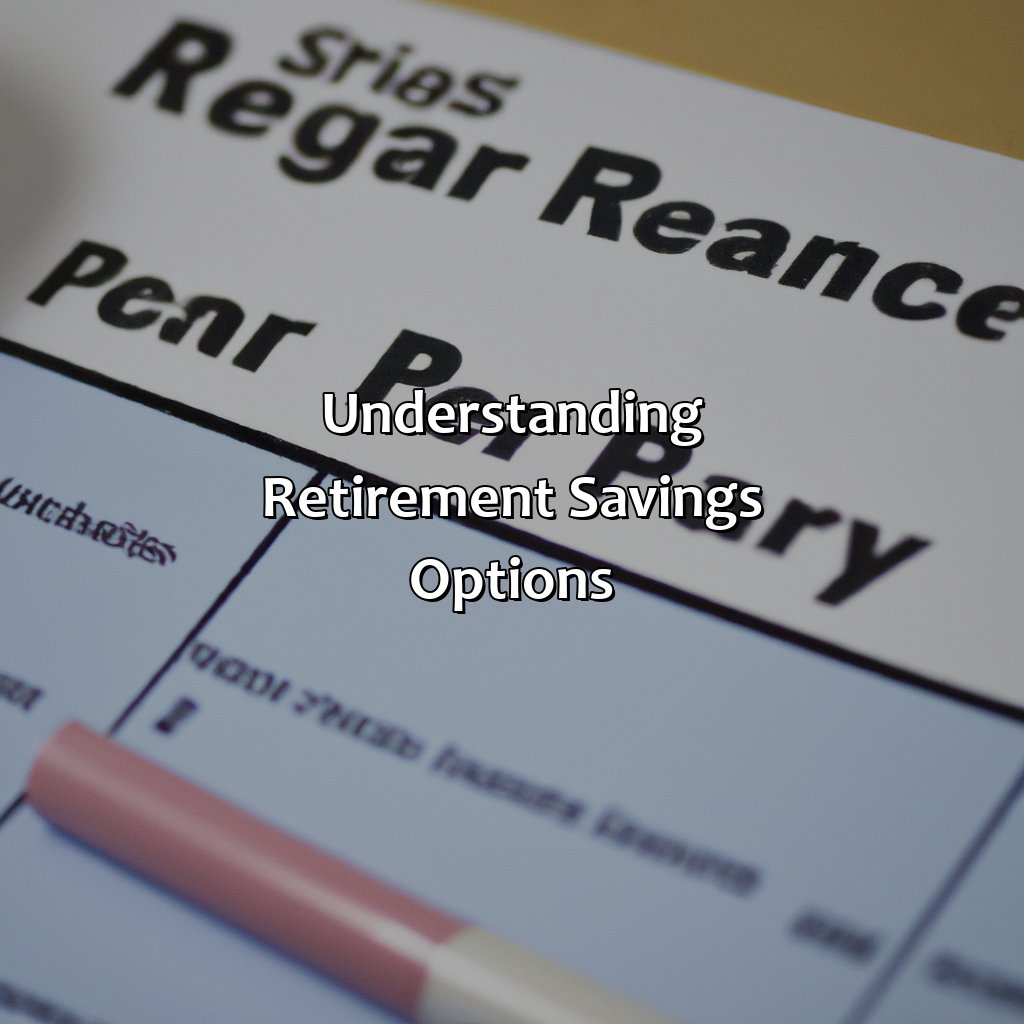How To Finance Your Retirement?
Key Takeaway:
- Assessing your retirement needs is the first step to finance your retirement. Consider your lifestyle, expenses, and potential sources of income to determine how much money is needed to sustain your retirement.
- Understanding different retirement savings options is crucial to creating a solid retirement plan. Research and analyze options such as 401(k), IRAs, pension plans, and Social Security benefits to make informed decisions about your retirement savings.
- Creating a retirement budget is essential for tracking expenses and managing income. Identify potential sources of income and plan for healthcare costs to ensure a smooth retirement journey.
- Developing a retirement income plan involves choosing the right investment portfolio and maximizing Social Security benefits. Work with a financial advisor or professional to tailor a retirement income plan that suits your specific needs and lifestyle.
- Implementing your retirement plan is an ongoing process that requires regular reviews and adjustments. Seek professional advice if needed and make necessary changes to your plan to ensure a comfortable and stress-free retirement.
Got retirement on the brain? You’re not alone! Financing your retirement can be daunting, but with the right strategy, you can feel secure in your future. In this article, we’ll show you how to create a retirement plan that works for you.
Assessing your retirement needs
Assessing Your Retirement Needs
Planning for a comfortable retirement requires assessing your financial needs thoroughly. It entails estimating the amount required for daily expenses like food, shelter, healthcare while keeping in mind unforeseen expenses like emergency medical bills. Start by calculating the amount you need for a retiree lifestyle, enabling you to live without the stress of working.
Planning your prospective expenses and analyzing your current savings is crucial to determine how much you would require during retirement. There are multiple factors to evaluate, including monthly bills, travel plans, and other activities you may participate in during retirement. These computations will help you set realistic goals to save for retirement and invest in growth-oriented funds.
While planning, it’s essential to re-examine the numbers regularly, keeping in mind life expectancy and staying financially secure. One strategy could be to use a mix of savings, pension, and other income sources to supplement your needs after retirement.
Years ago, a friend of my grandparents retired without planning for the future. He never anticipated that he would live as long as he did and quickly depleted his savings. Unexpected healthcare expenses and the cost of living took a financial toll, forcing him to rely on others for support. His story exemplifies the importance of investing and estimating for a comfortable retirement.

Image credits: retiregenz.com by Adam Duncun
Understanding retirement savings options
An Insight into Retirement Savings Options
Retirement savings options can help you have a financially secure future. Let us understand various investment options that can cater to your needs after retirement.
Retirement savings options include investing in stocks, mutual funds, fixed income securities, and retirement plans offered by employers. Stocks and mutual funds generally offer high returns but come with a higher risk. Fixed income securities can provide steady returns with relatively lower risk.
Additionally, some employers provide benefits like a defined contribution plan or 401(k) plan. Such plans let you invest a part of your salary as an investment and receive matched funds from your employer.
It is noteworthy that investing in different plans or a combination of plans can help diversify risk and maximize returns.
A true fact is that investing in sensible retirement plans from an early age helps accrue decent retirement savings. Start planning NOW!

Image credits: retiregenz.com by Harry Woodhock
Creating a retirement budget
Creating a Retirement Spending Plan
Plan your retirement budget carefully to live a comfortable life without running out of money. Take into account all the expenses and incomes, and plan for unexpected circumstances.
To start with, identify your sources of income, such as income from pensions, social security, or investments. Then, list your expenses, including housing, food, transportation, and healthcare. Allocate money for emergency funds, taxes, and entertainment.
Don’t forget to keep inflation in mind and aim to maximize your returns on investments. Avoid spending too much in the initial years of retirement, as you may need the savings to tide you over in the future.
Consider downsizing your home or relocating to a more affordable area. Consolidate your debts and pay off any high-interest loans. Consult a financial planner who can help you make informed decisions.
By creating a well-thought-out retirement spending plan, you can ensure a stress-free and financially stable retirement life.

Image credits: retiregenz.com by Harry Woodhock
Developing a retirement income plan
Developing a comprehensive plan for a consistent stream of income throughout retirement is essential. To create an optimal retirement income strategy, it is crucial to assess your retirement needs, estimate your expenses, and evaluate different income sources, including pensions, Social Security benefits, and investments. Prioritizing safety and growth in your investment portfolio, along with tax-efficient withdrawals, is a key component to any successful retirement income plan.
To further enhance your retirement income plan, consider delaying your Social Security benefits and working part-time to supplement your income. Additionally, creating a budget and staying within your means can help stretch your retirement income further.
It is worth noting that 81% of Americans are unsure of how much they need to save for their retirement, according to a 2021 survey by Charles Schwab. Ensuring that you have a well-thought-out plan can help provide confidence and financial security during your golden years.

Image credits: retiregenz.com by Harry Arnold
Implementing your retirement plan
Implementing Your Retirement Plan: A Professional Guide
Planning for retirement is essential, but implementing it is equally crucial. Here are five steps to help you implement your retirement plan:
- Determine your retirement income needs.
- Calculate your future Social Security benefits.
- Save for retirement systematically.
- Invest with a long-term perspective.
- Monitor and adjust your retirement plan regularly.
It’s important to note that each step is critical and requires thoughtful consideration. For instance, saving systematically will help you reach your retirement goals and ensure you don’t overspend during retirement.
When implementing your retirement plan, another essential detail to consider is your risk tolerance. Understanding your attitude to risk can help you invest your money in a way that aligns with your goals and retirement horizon.
A true history that illustrates the importance of implementing your retirement plan is the 2008 financial crisis. Many retirees who were relying on their investment portfolios had to delay or significantly alter their retirement plans due to market declines. Knowing how the market works and incorporating a pragmatic approach can help you succeed in retirement.

Image credits: retiregenz.com by Adam Woodhock
Some Facts About How To Finance Your Retirement:
- ✅ Start planning for your retirement early, ideally in your 20s or 30s. (Source: Forbes)
- ✅ Consider investing in a 401(k) or IRA to save for retirement. (Source: The Balance)
- ✅ Plan to have multiple sources of income in retirement, including Social Security, pensions, and personal savings. (Source: Investopedia)
- ✅ Estimate your retirement expenses carefully and plan for unexpected costs. (Source: Fidelity)
- ✅ Consider consulting a financial advisor to help you create a retirement plan that works for you. (Source: NerdWallet)
FAQs about How To Finance Your Retirement?
What are some effective ways to finance your retirement?
There are various effective ways to finance your retirement, such as:
- Investing in a retirement account like a 401(k) or IRA
- Building up a diversified investment portfolio
- Reducing expenses and living below your means
- Delaying Social Security benefits to increase payouts
- Considering a part-time job to supplement retirement income
Can you rely solely on Social Security for retirement income?
No, relying solely on Social Security for retirement income is not recommended. Social Security benefits are designed to supplement retirement income, not serve as the only source of income. You should also focus on building up additional savings and investments to ensure financial security in retirement.
How much should you save for retirement?
The answer to this question depends on your individual circumstances, such as your current income and lifestyle. However, a general rule of thumb is to save at least 10-15% of your income starting from a young age and increase that amount as you approach retirement age. You should also consider factors such as inflation, healthcare costs, and other expenses when determining your retirement savings goals.
What are some common retirement income sources?
Some common retirement income sources include:
- Social Security benefits
- Employer-sponsored retirement accounts like 401(k)s
- Personal savings and investments
- Pensions
- Part-time employment or self-employment
Is it ever too late to start saving for retirement?
No, it’s never too late to start saving for retirement. Even if you begin saving later in life, you can still make significant progress and improve your financial situation in retirement. You may need to be more aggressive in your savings and investment strategies to make up for lost time, but starting now is still better than not starting at all.
What should you do if you’re behind on retirement savings?
If you’re behind on retirement savings, there are several steps you can take:
- Reduce expenses and increase contributions to retirement accounts
- Consider taking on a part-time job to increase retirement income
- Delay retirement or continue working part-time during retirement
- Talk to a financial advisor to develop a plan for catching up on savings



